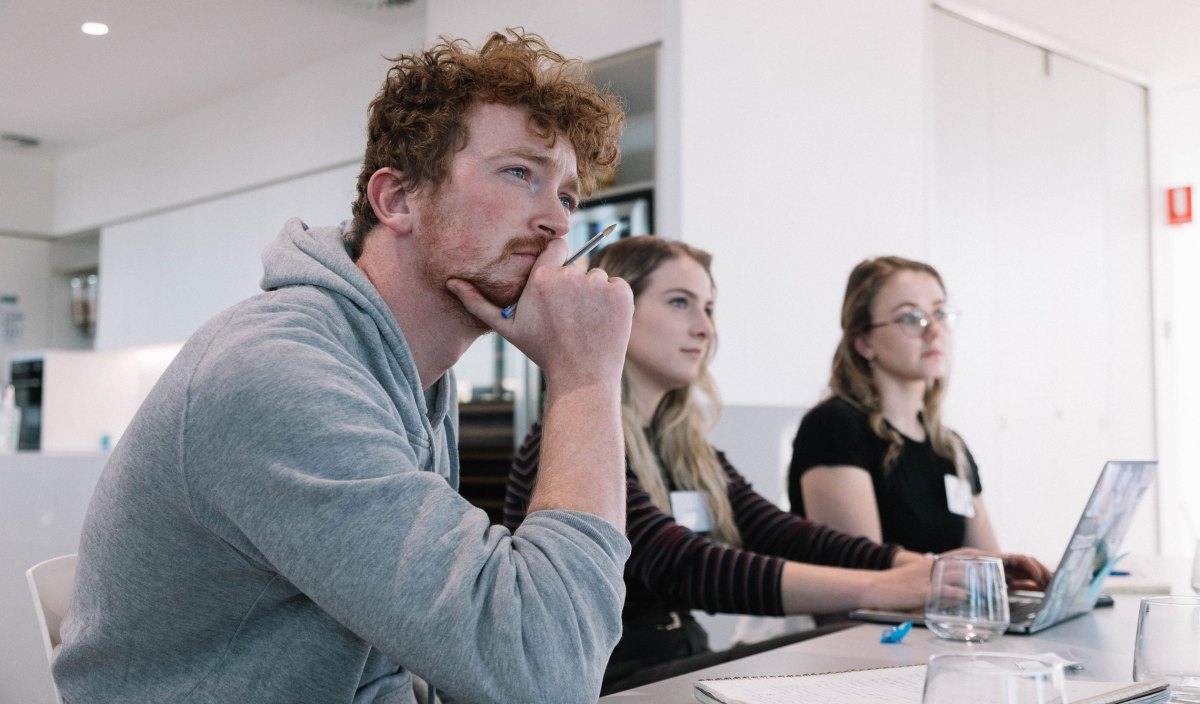CRAM’s creative innovators set to take centre stage
The co-founders of independent South Australian arts company CRAM Collective are taking bold steps to transition from emerging to professional theatre-makers thanks to the Helpmann Academy Creative Innovator Program.

CRAM's co-founders say the seed funding they have been awarded through the 2022 Helpmann Academy Creative Innovator Program will strengthen the collective as a creative business.
Following on from a highly successful pilot program, the Helpmann Academy Creative Innovator Program returned in 2022, with nine local creative businesses taking part.
One of those businesses was the CRAM Collective, an independent arts company with a focus on “cramming” a range of creatives and art forms together to create ground-breaking, brave new work. Made up of Flinders University graduates Connor Reidy, Ren Williams Aarod Vawser and Melissa Pullinger, CRAM hopes to “redefine the Adelaide art scene”.
Over eight months, the CRAM team joined the nine other emerging creative entrepreneurs in the Creative Innovator Program, which provides participants with $2000 in seed funding, matched one-on-one mentoring from an established arts practitioner, access to workshops and masterclasses delivered by leading business professionals, contact with a pool of industry experts and business advisors, access to a co-working space, and networking and pitching opportunities.
Co-founder Vawser says that the program came at the perfect time in the creation of CRAM, with the quartet seeking a deeper understanding of the business requisites of their creative endeavour.
“This program has really opened our eyes to the world of creative business,” he says.
“We learnt our creative skills at university, but the business side of things doesn’t come naturally to us. We have come a long way over the past six months and have a much stronger understanding of what is required to continue to run our business successfully, and what a self-sustainable future for CRAM looks like.”
Pullinger says that in this crucial early stage of building their business, the mentorship element of the program has provenvital.
“We have been learning more in-depth business skills, such as creating a business plan, registering the business name, and understanding taxes and GST,” she says.
“We are incredibly grateful to have had the opportunity to be paired with our business mentor, Andrew Camens, from Perks, and have really enjoyed getting to know him and learning how to operate our business successfully with his guidance.”
This relationship, along with the connection with their creative mentor Julian Hobba, executive director at State Theatre Company South Australia, was where the team found the greatest value in the program.
“I think the biggest takeaway has been the importance of mentorship,” says Reidy. “It can be so helpful to seek guidance from someone who has already experienced all the successes and failures of starting a creative business.”

CRAM Collective’s Aarod Vawser, Ren Williams and Melissa Pullinger.
After the emerging creative entrepreneurs pitched their business ideas to a panel of esteemed judges, the 2022 Helpmann Academy Creative Innovator Program culminated in an event where the recipients of the major seed funding were announced. The pitching panel consisted of Alexandra Dimos, managing director of Nunn Dimos Foundation; Eloise Leaver, ThincLab International Incubator Program manager and manager of ThincLab Waite, University of Adelaide; Jane Andrew, senior lecturer and director of Match Studio at University of South Australia; and Verity Kingsmill, interim lead, Flinders University’s New Venture Institute.
At an event at held at Pridham Hall on October 13, CRAM was awarded $20,000 in seed funding, plus an ongoing mentorship from State Theatre Company South Australia and an incubator space at Flinders University’s New Venture Institute, after the panel of judges deemed their professional pitch the most impressive.
Each project received seed funding of $2000 with additional prizes awarded to:
- Bridie Walsh – 12-month mentorship plus incubator space at University of South Australia’s Innovation & Collaboration Centre.
- Chloe Tornow – incubator space at the University of Adelaide’s ThincLab.
- Felicity Boyd – incubator space at Flinders University’s New Venture Institute.
- Tim Whiffen – incubator space at the University of Adelaide’s ThincLab.
“The seed funding will go towards ensuring CRAM has a viable foundation and strengthen it as a creative business,” Reidy says of the collective’s win.
“We are using the funding to maintain annual company costs, strengthen our publicity and improve the quality of our shows. All of this takes our practice to the next level and helps us transition from emerging to professional theatre-makers.”
After an already busy start to 2022 (including two sell-out world-premiere shows and the development of a CRAM hub on Pirie Street), CRAM has big plans brewing for 2023.
“Coming away from the Creative Innovator Program, CRAM is keen to continue to build upon the momentum we have been creating in the 10 months since our launch,” Pullinger says.
“We look forward to putting our goals from our business plan into place, with another two productions next year. We’re also looking forward to continuing to foster a creative community in Adelaide with regular CRAM SCRAMS and our artist-in-residence program.”
As for other trepidatious budding entrepreneurs considering the program, CRAM has a very simple message.
“Go for it,” advises Vawser. “Regardless of where you are in your creative business, what model you operate on or what your dreams are going forward, there is something to be learnt from this program. You will have developed skills by the end of the six months that you wouldn’t have otherwise, and so many opportunities will open up for you from just completing it.
“It is hard, and often throws up challenging questions, but tackling those questions helped us towards the most valuable learnings we got from this program.”




